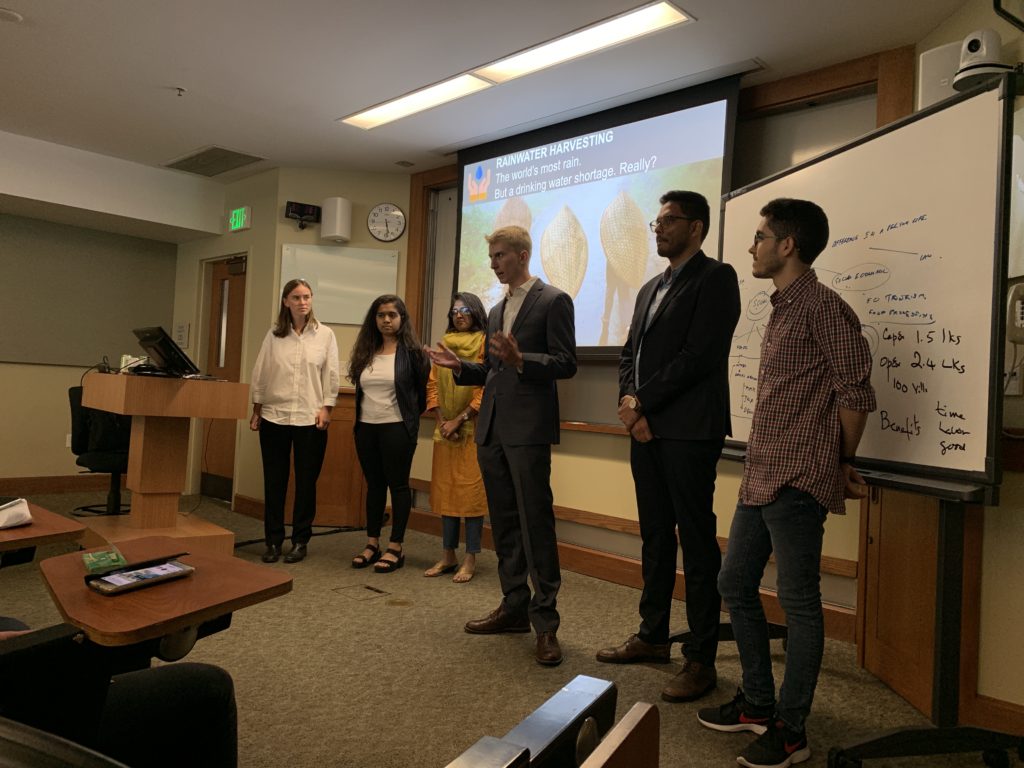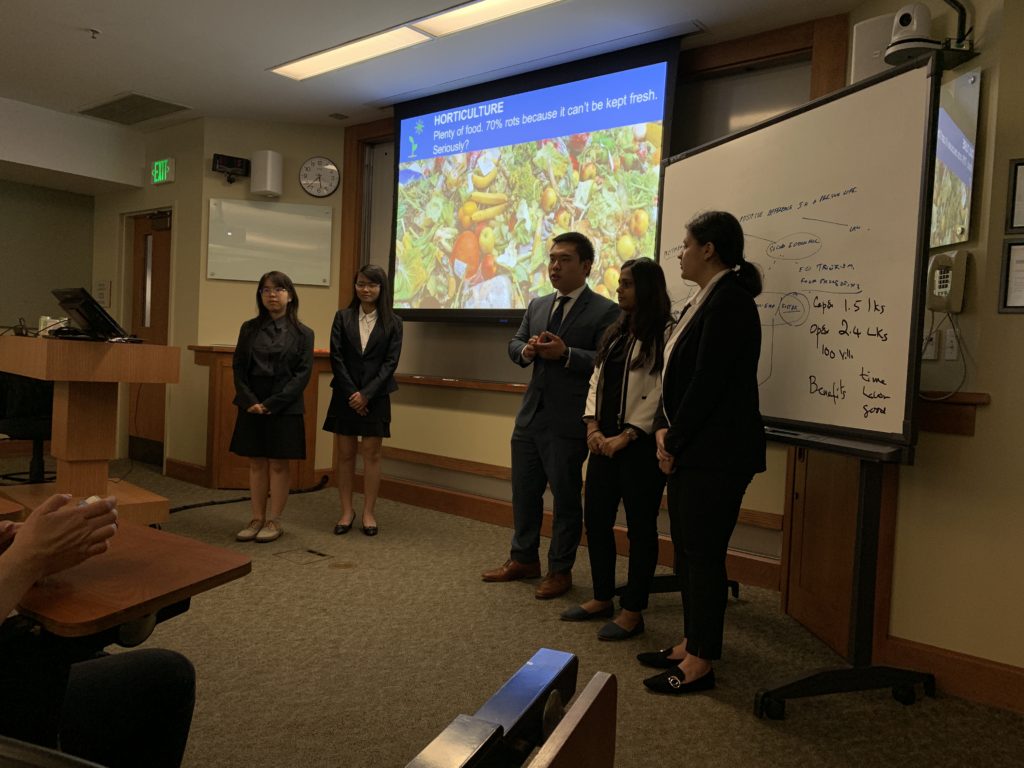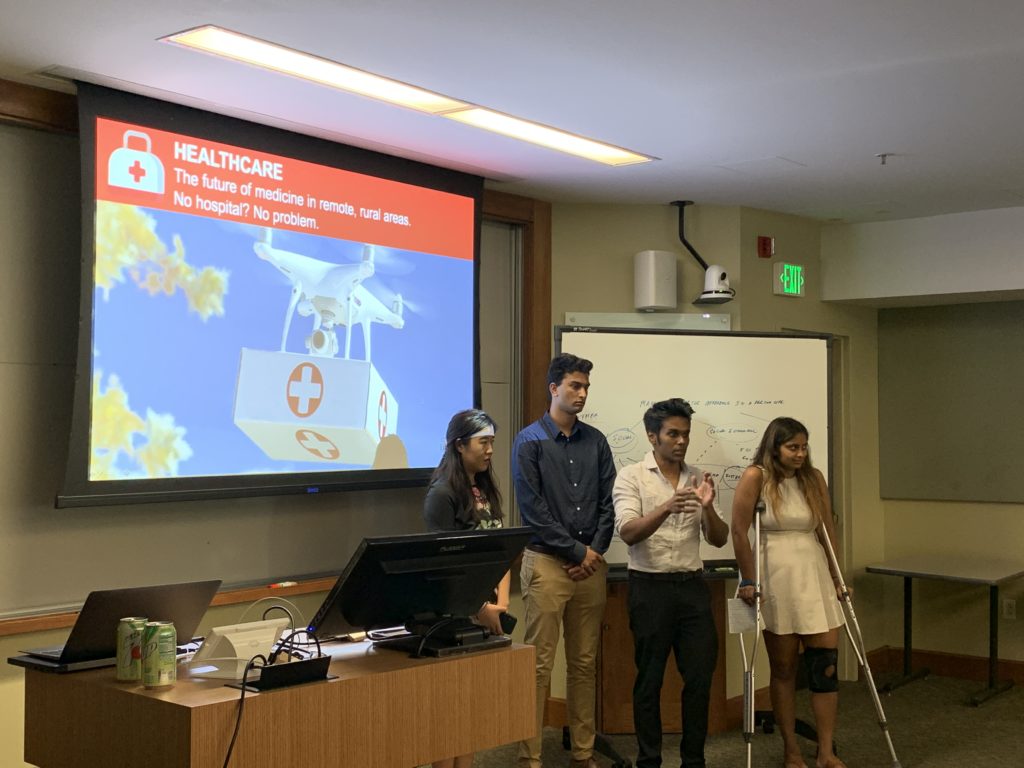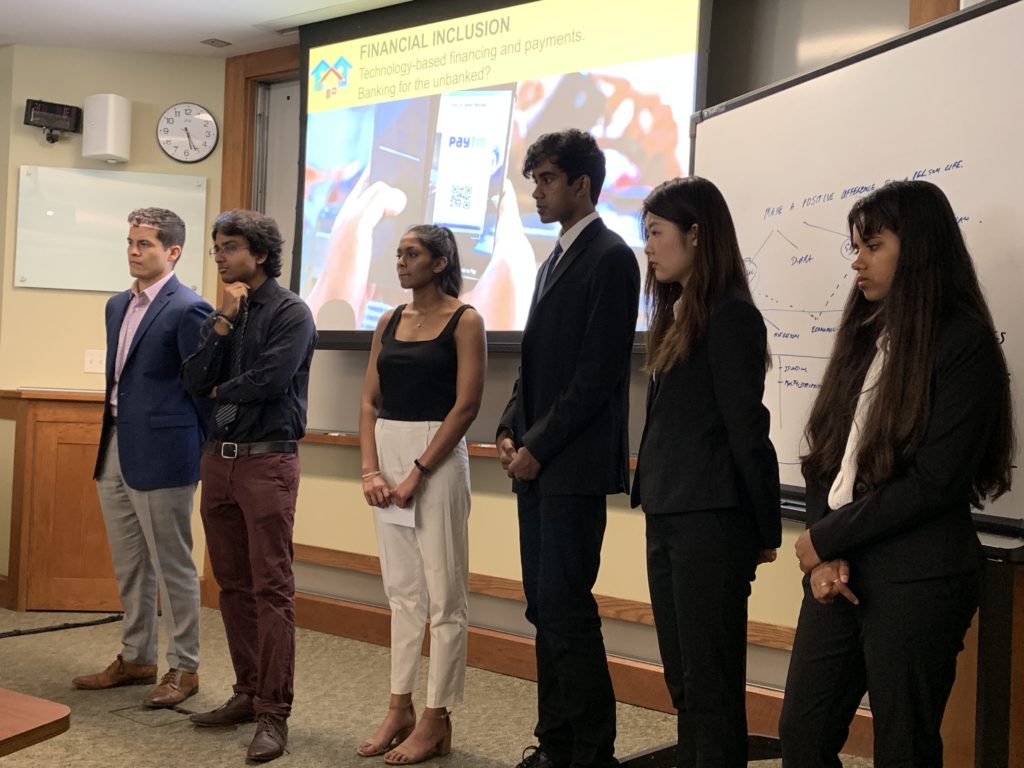Smart Villages: Students Pitch to Chief Minister of Meghalaya
Students taking the Smart Villages Challenge Lab have been tasked with developing digital technologies and platforms to help impoverished Indian villages to utilize their natural resources and access global markets.
The area selected this semester was the state of Meghalaya, and each team was assigned one particular challenge in regards to improving Meghalayan villages: Eco-Tourism, Rainwater Harvesting, Horticulture, Healthcare, Turmeric, and Financial Inclusion.
It was then entirely up to the students to take their issue and run with it. They formed teams, conducted research, and ultimately developed a proposal to integrate technological solutions to these ongoing issues.
This proposal was made more interesting when students learned that it was to be given in front of the actual Chief Minister of Meghalaya, Conrad Sangma.
After weeks of preparation, the teams recently pitched to Chief Minister Sangma last week. We had the good fortune of sitting in and documenting these proposals. Each team showed a contagious passion, drive, and innovative spirit, united in the mutual goal of helping to solve the issues faced by Meghalaya today.
Eco-Tourism
The Eco-Tourism team boasted a bright green root bridge as the world’s next potential hiking destination.

Their pitch centered on the creation of a Yelp-like digital platform for indicating the location of various points of interest within Meghalaya. This would encourage tourists unfamiliar with the area to engage with local street food, nightlife, and other unique Maghalayan offerings. Additionally, it would spark the entrepreneurial spirit of local Meghalayan people who want to increase their business opportunities. With a platform such as this, the team claims a potential 10x increase in traffic to local village destinations.
Rainwater Harvesting
Astonishingly, Meghalaya receives 5x the rainfall in 2 months that New York does on an annual basis. With a stunning 470 inches of annual rainfall, Meghalaya is famously known as the wettest place on Earth. Despite this fact, much of the natural rainwater drains to waste rather than being harvested or used to generate energy.

The solution, according to the rainwater harvesting team, is to harness local practices of horticulture and agriculture, promoting the use of frog ponds and fisheries to advance economic output. The team also discussed the potential to generate hydroelectricity with all the excess rainfall.
What we’re looking for at the end of the day are affordable, doable, and non-disturbing solutions. Well-planned implementation, well-though-out, and effective.
Chief Minister Sangma
Sangma also mentioned that an ideal system would produce small amounts of energy, using the natural flow of water, which would be entirely symbiotic with the natural life of the ecosystem. The team dutifully took note of his feedback with hopes to integrate it as their project evolves.
Turmeric ~ An abundant resource
Indigenous to Meghalaya, Lakadong Turmeric is a magical spice with anti-inflammatory, anti-cancer, and antioxidant properties. The perfect combination of climatic conditions and soil composition makes Meghalaya’s turmeric 100%-300% more concentrated than any other natural turmeric in the world.

The Turmeric team says that despite this abundance of high-quality turmeric, Meghalaya’s production of the unique spice is bottlenecked by a variety of addressable problems. With too many middlemen, inefficient supply chains, and a lack of proper equipment, what could be a gold-mine currently remains unexploited resource. The team hopes to produce extremely high-quality turmeric by partnering with brands such as Lush, L’oreal, and Alta, all of whom use much lower-concentration turmeric in their beauty products.
Horticulture & Food Waste
“70% of produce in Meghalaya rots because it cannot be kept fresh. 220 tons per day. This is the amount of food going to waste in India due to insufficient supply chains.”

The team has a 3-step process to fix this simple problem:
(1) Implement a farming cooperative in Meghalaya.
The cooperative would offer educational techniques for farming and harvesting that increase agricultural capabilities. This would allow farmers to enter the global market, as well as to model a system of fair-trade.
(2) Invest in a cold-storage system.
Preservation is absolutely key to increasing shelf-life and reducing food waste. Therefore, the team proposes investments in a cold-storage system in conjunction with early picking methods and the use of ethylene gas to slow the natural ripening process of produce.
(3) Implement sustainable infrastructure
By integrating refrigerated trucks and trains into the natural commerce of Meghalaya, there would be an increased capability to travel with large quantities of preserved food.
Healthcare
The healthcare team started on a creative note. The student in crutches began the presentation, “Recently, I tore my ACL. Luckily, I was fortunate enough to have top-notch healthcare just 2 minutes away. In Meghalaya, that is not the case. Most people are miles and miles from the nearest health center. With no internet connectivity and poor telecommunications infrastructure, their situation is much more difficult to solve.”

We want to give these communities their own opportunities to help each other. Healthcare is a right, not a privilege
Healthcare Team
The team proposed that an effective solution would be to connect villages in Meghalaya to information in the cloud, replicating the methods of connectivity achieved in Tanzania. In addition to cloud computing, the team proposed an SMS service to process and respond to health information using an AI chatbot. The chatbot would answer all health-related questions, providing responses, recommendations, and immediate resources for emergencies.
Financial Inclusion
Imagine the potential here; we have an increase in banking and transparency on one hand, and an increase in financial literacy, inclusion, and creditworthiness on the other.

This is the vision of the team focused on financial inclusion. They pitched a financial services platform with SMS capabilities, deposits, withdrawals, purchases, and bill-paying – all done entirely online.
The team hopes to tap into the business potential of companies in Meghalaya and allow for more seamless financial transactions to take place. Citing issues of financial literacy and low creditworthiness, the team hopes to solve these with an easy-to-use digital platform.
Chief Sangma responded to this proposal with much interest, claiming that “the biggest challenge we currently have in terms of financial inclusion is that we don’t have brick and mortar banks. People have to travel 20-30 km to reach the nearest bank.”
Stepping outside of their comfort zones, these students creatively embraced the challenge of solving real-world issues in an area of India which they have never been before. In thinking outside of the box to solve global issues, these students are becoming one step closer to contributing to true progress; not just in the U.S. but across the world.
The post Smart Villages: Students Pitch to Chief Minister of Meghalaya appeared first on UC Berkeley Sutardja Center.